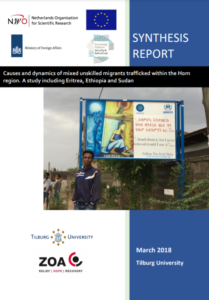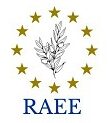Author: Prof. Dr. Mirjam van Reisen (PI), Dr. Mia Stokmans, Selam Kidane, Kristina Melicherova, and Rick Schoenmaeckers
Year: March, 2019
Language: English
Published By: Tilburg University

Abstract
This study of mixed migration and human trafficking explored its causes within dynamic information-sharing along the migration routes and across communities in locations where migrants or refugees are. This study was carried out in Sudan and Ethiopia, focusing on Refugees from Eritrea within host communities.
This study found that human trafficking dynamically moves across such locations and across communities. The lack of support to victims of human trafficking, especially stigmatization of single mothers who have experienced sexual violence and their children, may keep them trapped in a Human Trafficking Cycle.
Social media are an important source of information. Minors, with little connectivity, demonstrated ingenuity in establishing contact with people close to them, across the globe, and this is their principle source of information. Livelihoods are a big challenge in transit communities, which lack access to basic needs such as water, food and shelter and have no access to income generating activities.
The high prevalence of Post-Traumatic Stress leads to collective trauma amongst refugee populations. In this research a Self Help Low Cost Post Traumatic Stress (SHLCPTS- tool was tested. It proved to be highly effective on reducing trauma, increasing social capability and socio-economic resilience.
The policy implications point to the need to revisit the theory of ‘push-and-pull’, which is at the basis of current policies to reverse the migration crisis by fear-inducing obstacles to mobility. The findings suggest that these measures may be counterproductive and enhance a ‘thinking-fast’ mode which leads to be more prone to fleeing and risk-taking.
Alternatively, a policy of care for trauma, enhancing livelihoods and out-of-camp policies will help migrant and refugee youth to consider options based on resilience and positive appreciation of support available to them.
